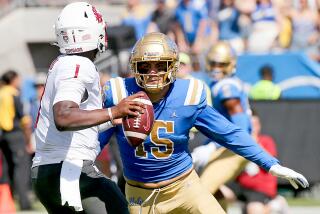An Open-and-Shut Case : Giving Up Normal Teen Life Got Tu to National Championship
- Share via
NORTHRIDGE — Meilen Tu’s eyes were gleaming, her voice was frolicking and her rare energy was flowing.
Jet black hair pulled back into a ponytail, an ice pack wrapped around her right shoulder after one of her strenuous workouts, Tu was laughing and poking fun at herself.
But even though she is delightfully humorous about her lot in life as one of the world’s top junior tennis players, Tu attacked some of the questions posed to her as she would an opponent on the court: with deadly seriousness.
“I’m sacrificing the normal teen-age life,” she said. “But it doesn’t bother me that I can’t go out every Friday and Saturday night till, like, 2 o’clock in the morning.”
Last fall, Tu withdrew from Granada Hills High and entered the Los Angeles Unified School District independent study program. The switch separated Tu from her classmates but allowed her to continue school while she toured the world with a U.S. Junior team.
The move paid off. Tu has earned a wild-card entry into her first Grand Slam tournament: the U.S. Open.
At 16, Tu is the youngest player and the only junior in the 128-player draw. She qualified last month by winning the United States Tennis Assn. girls’ 18-and-under national tournament in San Jose. In last week’s International Tennis Federation world junior rankings, Tu was tied for fifth with Siobhan Drake-Brockman of Australia.
Tu’s first-round opponent at Flushing Meadow, N.Y., Monday is Silvia Farina of Milan, Italy, who was ranked 85th last year on the Virginia Slims Tour.
Bill McClain, Tu’s coach, says Tu could win as many as three matches and that she could be good enough to crack the world’s top 20 by the time she’s 20. But Tu, beset by injuries and bad fundamentals a year ago, is concerned about being overwhelmed by her surroundings.
“The professionals, they walk around with a strut,” said Tu, 5 feet 5 and 105 pounds. “They’re the best and you are just nothing. They’re thinking, ‘You’re just a wild card. You’re 16 years old. What are you doing here? I own this turf.’
“I hope not to get nervous and freak out. I have to believe in myself. My coaches believe I’m just as good as anyone out there. They tell me don’t look around at the crowd. Because that’s really intimidating, all those eyes just on you. Don’t think that I’m at the Open. Pretend that I’m playing here.”
“Here” is the Warner Center Club in Woodland Hills, a quiet domain located atop a seven-story parking garage where Tu practices and trains four hours a day. At Warner Center, McClain and the staff treat Tu like their own Steffi Graf.
Tu lifts weights with a personal trainer and has a massage therapist to go with the daily tutoring of McClain, 56, who coached for 19 seasons at South Carolina, Alabama and Southern Methodist before meeting Tu 14 months ago.
It is not the routine of a normal teen-ager, but McClain doesn’t think that Tu has suffered.
“She’s got as good a head on her shoulders as anybody I’ve seen at this point in life,” he said.
Said Tu: “I think a lot of people that don’t know me think I’m going to burn out. They watch me play. I grind, I grind. I yell, I yell. And they probably think, ‘Gosh. She has no social life.’
“I don’t--up to a point. I don’t need to go out every night. I don’t need to be on the phone for an hour and a half. I don’t need a boyfriend right now.”
She laughed.
“God. Who would want me as a girlfriend?” she said. “I’d be such a pain in the butt. I’d complain half the time. After a long day, I just want to kick off my shoes and relax.”
Tu said she has only one close friend and that she spends most of her free time with her family: older sister Helen, a former UCLA player now studying art at New York University, father Ching, a retired engineer, and mother Mei. Her parents, both born in China, are part-time real estate brokers and full-time tennis parents.
“I think they want it more than me,” Tu said. “My mother seems really intense and a lot of people think she’s hard on me. She really isn’t. I’m the hardest person. She takes care of everything for me.”
Tu said she would have continued attending Granada Hills--where she would have been a senior this fall--if her teachers were more willing to work with her. But they could not accept her commitment to travel with the junior national team for months at a time.
Her school counselor finally recommended the independent program, in which she reports to a Van Nuys center to take tests. She studies in hotel rooms, between matches, in airports. The only thing she misses about campus life is gossip.
“But I actually still hear it,” she said, “because my friend, Jeannie, tells me everything.”
Tu’s best friend, Jeannie Kulwin, believes she made the right decision by leaving school.
“Look where she’s at,” Kulwin said. “She’s going to be successful.”
Kulwin said Tu’s former classmates always ask about her and want to see her. Tu, smiling weakly, says she doesn’t have time to see them, but she hopes she’s not perceived as a prima donna. She hopes her former classmates can understand what it takes to be an international success and a rising star.
But before Tu met McClain 14 months ago, her tennis game was going nowhere because of bad fundamentals and a troublesome back injury.
“Her serve was awful,” McClain said. “She just pushed the ball over the net with her deltoid muscle. She used nothing but her arm on her ground strokes and she hit the ball perfectly flat. No spins. No slices. But she had a lot of foot speed and quickness. She was so fast, it was almost impossible to hit a ball past her.”
But McClain also detected her love for the game and a fierce desire to improve, along with perhaps the most important intangible trait of a champion.
“She’s about the most mentally tough kid I’ve seen in my life. She absolutely refuses to give up anything.”
“She used to hit a lot of moon balls,” said Ania Bleszynski of Thousand Oaks, a friend and rival who lost to Tu, 6-1, 6-2, in the semifinals of the recent girls’ 18 nationals. “But she’s gotten much stronger. (Now) she can wipe you off the court.”
In January, Tu wondered if she would have any success this year, coming off the injury and having to relearn the fundamentals. She quickly got the answer in February when she scored a first-round victory in a small professional satellite event in Florida.
She went on to win two ITF Junior tournaments: the Banana Bowl on clay in Sao Paulo, Brazil, in April, and the Surbiton (England) International Junior Championship on grass in July.
“I didn’t say (at the beginning of the year) my goal was to play the U.S. Open,” Tu said. “I just worked to improve my game. But I’m playing with a lot more confidence. I’m ready. Who’s ever out there, they better watch out. Because if I play well. . . . I’m playing well enough to beat any player, and I’ve got nothing to lose.”
More to Read
Get our high school sports newsletter
Prep Rally is devoted to the SoCal high school sports experience, bringing you scores, stories and a behind-the-scenes look at what makes prep sports so popular.
You may occasionally receive promotional content from the Los Angeles Times.






